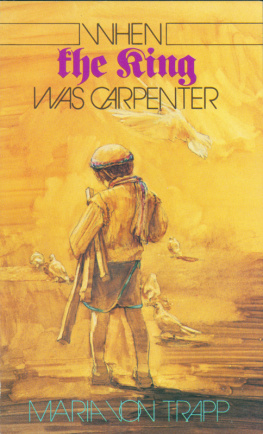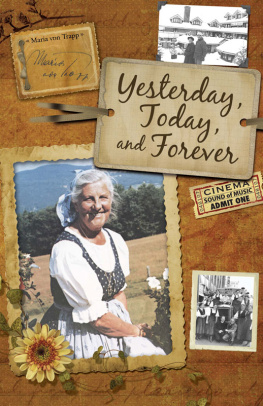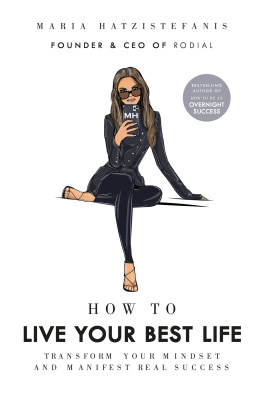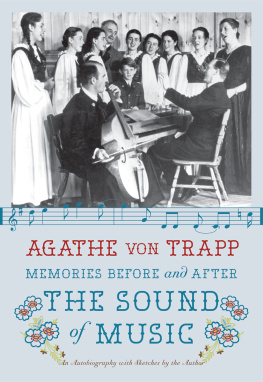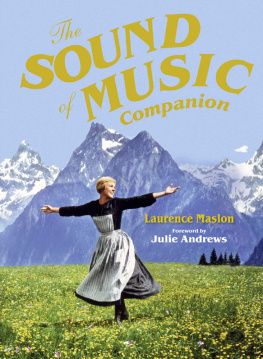When the King Was Carpenter
Maria von Trapp
Copyright Information
When the King Was Carpenter: copyright 1976.
Copyright 2000 by New Leaf Press. All rights reserved. No part of this book may be used or reproduced in any manner whatsoever without written permission of the publisher except in the case of brief quotations in articles and reviews. For information write: New Leaf Press, Inc., P.O. Box 726, Green Forest, AR 72638.
Unless otherwise noted, all Scripture references are from the Revised Standard Version of the Bible.
Printed in the United States of America.
Please visit our website for other great titles:
www.newleafpress.net
For information regarding publicity for author interviews contact Dianna Fletcher at (870) 438-5288.
Contents
Foreword
How did this book ever come to be written? So far, all my books have had to do with my family. Well, this one at least began with the family, with one incident, 50 years ago.
Little Martina, aged four, didnt like oatmeal. (As this happened back in Europe, we called it porridge.) She used to spread her helping very thinly all over the plate, hoping to create an "almost finished" impression.
In passing by I looked down at her and said, "Martina, the child Jesus would never have done this."
Quick as a wink, she snapped back, "Did He have to eat porridge for breakfast, Mother?"
And, embarrassed, again I had to answer, "Really, I dont know."
Now came the weighty words, "Why dont you find out?"
Her question stuck in me like a dart from then on. And that is the beginning of this book.
At first I tried the "direct question" method. As we had on our estate a chapel and a residing chaplain, there were many visiting priests coming. From now on I would approach each one wistfully, "Excuse me, Father, but could you tell me what Jesus might have had for breakfast when He was a child?" I was so convinced that they must have learned this in their seminaries.
Their answer invariably was, "I have no idea." (And I had thought that the life of Christ was the main topic of all seminary curricula!)
As my first approach to the solution of my problem did not work out, I thought of something else. If I, for instance, wished to know what kind of breakfast Mozart, Shakespeare, or even Julius Caesar ate, I would look into a well-written biography of these people. Therefore, I went into bookstores and libraries and came home with books on the life of Christ written by many eminent theologians, but neither Meschler nor Mauriac nor Ricciotti seemed the least bit interested in this particular question.
The years passed and we had come to America. For a while there were other things more important to be taken care of. But then my query flared up again when I found books now in English about the time of Christ. I had already begun back in Austria to jot down interesting items I had found in books, and now I found so many more.
Finally, I had compiled quite a collection pertaining to the everyday life of a Jewish family at the time of Christ: what were the mother and fathers duties; how a boy grew from babyhood into adolescence in five stages, each with a name; what they were wearing; and finally eureka! what they were eating. There was the answer to my $64 question: They didnt have any breakfast! They ate two meals a day: one in the late morning and the other in the late afternoon. With this I could have answered Martina and been done with it.
But there was so much interesting material collected already that I went ahead and finished the book. Then I realized that there would be many people who would read the book and be touched by it, having learned to know Jesus as a fellow citizen, so to speak, or a neighbor from next door. But there will be others who will wonder, Where did she find all this information? And those I have to disappoint by merely answering with titles and authors, as much as I still remember. (Some information I found when I went to the Holy Land and came in contact with scholars.)
At the end of the book there will be a reference list. My difficulty is that I cannot say now from which book came which information, but these are the only ones from which I gathered what is now so pleasant for you and me to know.
Chapter 1
A Happy Family
His earliest memories are the days of Nazareth just after the return from Egypt. He must have been about three years old.
The voice of His mother, "Mary of Nazareth," awakened her family every morning at daylight, calling out, "Blessed be he who loveth His people Israel."
Joseph Ben-David, her husband, whom the child called Father, would answer, "Blessed be He who loveth His people Israel." And that was the way the day started in every Jewish household.
The next thing was to make the beds. Each person slept on a narrow mat, which was rolled up and stood in a corner during the day. Their little house had only one room, which was a bedroom, dining room, and living room all in one.
As they put on their outer garments, Jesus could hear His parents pray. He was too small then to understand the words, but He knew that for everything they did throughout the day there were special "benedictions" to be recited. By and by He learned them all. There was one benediction for waking:
My Lord, the Spirit which Thou hast given me is pure. Thou hast created it and formed it into me and preservest it within me, And wilt one day take it from me And restore it unto me hereafter. So long as the Spirit is within me, I will give thanks unto Thee, O Lord, my God, sovereign of all works, Lord of all spirits. Blessed art Thou, O Lord, our God, King of the universe, Who restoreth the Spirits unto their bodies.
Then He heard, "Blessed art Thou, O Lord, our God, King of the universe, who raiseth up those who are bowed down."
There was a benediction for getting dressed: "Blessed art Thou, O Lord, our God, King of the universe, who clotheth the naked."
There was another benediction as they washed their face and hands: "Blessed art thou, O Lord, our God, King of the universe, who removeth sleep from mine eyes and slumber from mine eyelids."
And putting on their sandals, finally they said together, "Blessed art Thou, O Lord, our God, King of the universe, who hast supplied me with every want."
All these prayers Jesus was to learn by heart when He was a little older; but the first sentence His father taught Him was the beginning of the solemn morning and evening prayer, the Shma: "Hear, O Israel! The Lord, our God, is one! You shall love the Lord your God with all your heart and with all your soul and with all your might."
Every morning at the hour of prayer the father would draw Him close, and together they turned their faces toward Jerusalem. Only the men were required to say the Shma twice a day. Women and children were exempt, but this family prayed everything together. Always Jesus mother joined in and for Jesus these were the happiest moments of the day when He could talk to His Father in heaven and turn towards His house. Very soon He had learned the entire morning prayer and could repeat it with His whole heart.
The second part followed:
And if you will obey my commandments which I command you this day, to love the LORD your God, and to serve him with all your heart and with all your soul, he will give the rain for your land in its season, the early rain and the later rain, that you may gather in your grain and your wine and your oil. And he will give grass in your fields for your cattle, and you shall eat and be full. Take heed lest your heart be deceived, and you turn aside and serve other gods and worship them, and the anger of the LORD be kindled against you, and he shut up the heavens, so that there be no rain, and the land yield no fruit, and you perish quickly off the good land which the LORD gives you.

